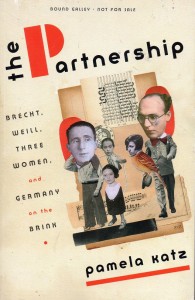Book Review: The Partnership by Pamela Katz
Disclaimer: I received this book as a Goodreads giveaway on the premise that I would review it. This copy was a bound galley, and changes have been made in the published edition (most notably, a proper index.)
The Weimar Republic, Germany after World War One and before the rise of the Nazis, was a time of great change. The Kaiser had been dethroned, militarism had been discredited with large sections of the population, and social movement was greater than ever before. But at the same time, the economy was dreadful, many in Germany felt they could have won the war if they weren’t “betrayed”, and political extremists rioted in the streets. This was the crucible in which the partnership of playwright Berthold Brecht and composer Kurt Weill was born.
The two men, brilliant on their own, inspired each other to greatness in their two most famous collaborations, The Threepenny Opera and The Rise and Fall of the City of Mahagonny, as well as a handful of lesser works. This volume concentrates on the years of their partnership and how it was facilitated by three important women, actors Lotte Lenya and Helene Weigel, and writer Elisabeth Hauptmann.
The partnership only lasted a few years, with brief reprises necessitated by their joint ownership of their plays. While there were many factors involved in the breakup (political differences, diverging artistic aims, Weill becoming independently successful in America), the author posits that the main reason the team splintered was that neither man could stand not being in charge. They hadn’t quite realized this during their initial creative period, but as the political climate changed, and each had his own goals in mind, it became obvious.
Brecht comes across as a deeply unpleasant person, the type of man who has three children by three different women before he even had a proper career. It feels like the biographer bends over backwards to excuse Brecht’s behavior towards his wives and mistresses (especially as he hypocritically expected them to be faithful to him.) He seems to have believed that his superior creativity and artistic vision gave him license to run roughshod over anyone in his path. It didn’t go over so well in America, where no one was impressed by his European reputation and he didn’t speak the language.
Weill, by contrast, though he had his flaws, seems to have known how to adapt his desire for creative control to the demands of Broadway, working with many excellent writers.
The book goes into great detail about the production of Threepenny; rehearsals were disastrous, entire parts had to be cut at the last minute, and it took several scenes in before the audience figured out which play they were watching. The song “Mack the Knife” was written and scored in 24 hours as a simultaneous concession to and dig at the actor playing MacHeath, as he’d demanded a song about how awesome his character was.
There’s also quite a bit of focus on the women; Lenya and Weigel brought their husbands’ work to life on the stage, and after they became widows truly kept the legacies alive as well as coming into their own careers. Hauptmann is a bit harder to read; as the translator who brought Brecht many of the works he freely adapted, and probably much more involved in his writing than was ever acknowledged by either of them, she’s a shadowy figure. The Weimar Republic gave women new freedom, but it was still in relation to powerful or creative men.
The book skimps on the parts of Brecht and Weill’s careers that did not involve each other; you’ll need to read their separate biographies for those. The writing gets a bit pompous at times, and there’s some use of gratuitous mind-reading, along the lines of “Weill would have enjoyed the breezes.”
There are extensive end-notes with bits that didn’t fit into the main text, and a good bibliography. I’d recommend this book to fans of Brecht, Weill and theater in general.
And if somehow you haven’t heard it before, here’s Lotte Lenya singing “Pirate Jenny” for the BBC.

